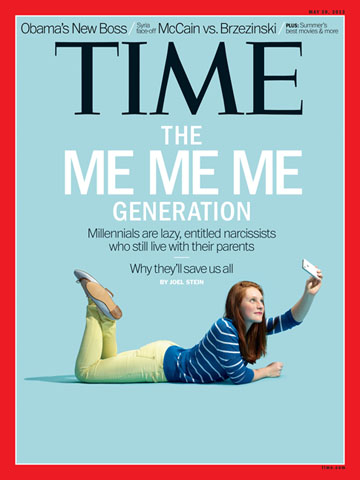
(4 of 8)
Millennials grew up watching reality-TV shows, most of which are basically documentaries about narcissists. Now they have trained themselves to be reality-TV-ready. "Most people never define who they are as a personality type until their 30s. So for people to be defining who they are at the age of 14 is almost a huge evolutionary jump," says casting director Doron Ofir, who auditioned participants for Jersey Shore, Millionaire Matchmaker, A Shot at Love and RuPaul's Drag Race, among other shows. "Do you follow me on Twitter?" he asks at the end of the interview. "Oh, you should. I'm fun. I hope that one day they provide an Emmy for casting of reality shows--because, you know, I'd assume I'm a shoo-in. I would like that gold statue. And then I will take a photo of it, and then I will Instagram it." Ofir is 41, but he has clearly spent a lot of time around millennials.
I have gone just about as far as I can in an article without talking about myself. So first, yes, I'm aware that I started this piece--in which I complain about millennials' narcissism--with the word I. I know that this magazine, which for decades did not print bylines, started putting authors' names on the cover regularly in 2004 and that one of the first names was mine. As I mocked reality shows in the previous paragraph, I kept thinking about the fact that I got to the final round for 1995's Real World: London. I know my number of Twitter followers far better than the tally on my car's odometer; although Facebook has a strictly enforced limit of 5,000 friends, I somehow have 5,079. It was impossible not to remember, the whole time I was accusing millennials of being lazy, that I was supposed to finish this article nearly a year ago.
I moved home for the first six months after college. When I got hired at Time, my co-workers hated me for cozying up to the editor of the magazine. I talk to one of my parents every other day and depend on my dad for financial advice. It's highly possible that I'm a particularly lame 41-year-old, but still, none of these traits are new to millennials; they've been around at least since the Reformation, when Martin Luther told Christians they didn't need the church to talk to God, and became more pronounced at the end of the 18th century in the Romantic period, when artists stopped using their work to celebrate God and started using it to express themselves. In 1979, Christopher Lasch wrote in The Culture of Narcissism, "The media give substance to, and thus intensify, narcissistic dreams of fame and glory, encourage common people to identify themselves with the stars and to hate the 'herd,' and make it more and more difficult for them to accept the banality of everyday existence." I checked my e-mail three times during that sentence.
So while the entire first half of this article is absolutely true (I had data!), millennials' self-involvement is more a continuation of a trend than a revolutionary break from previous generations. They're not a new species; they've just mutated to adapt to their environment.
